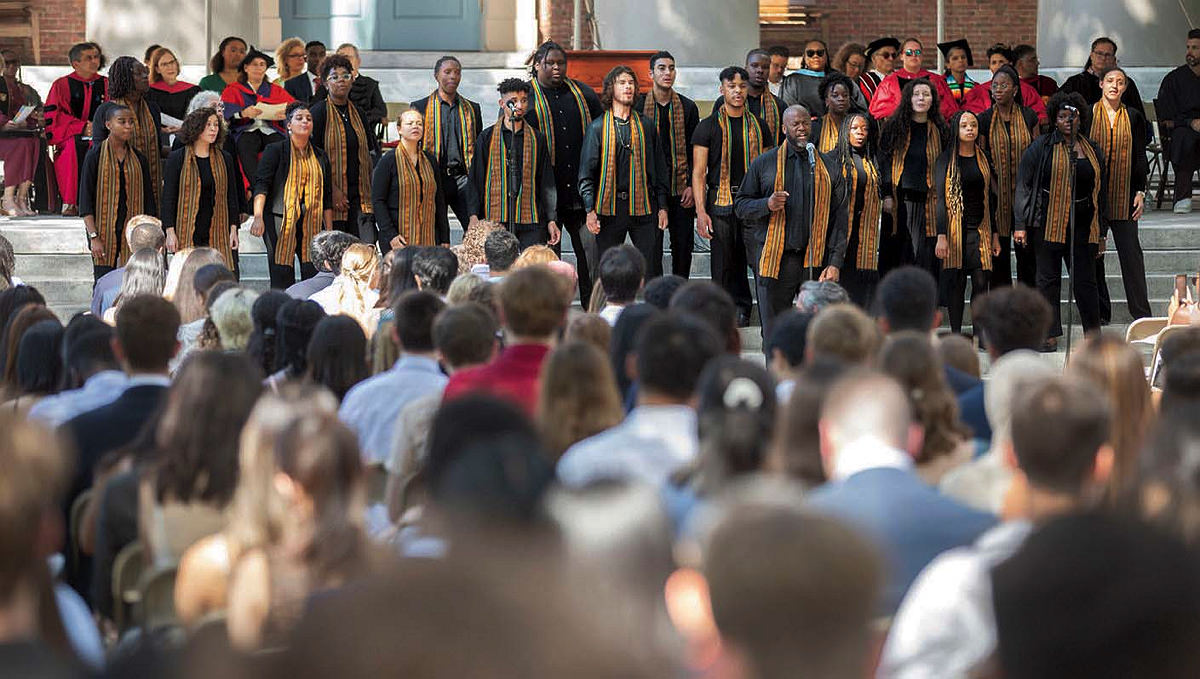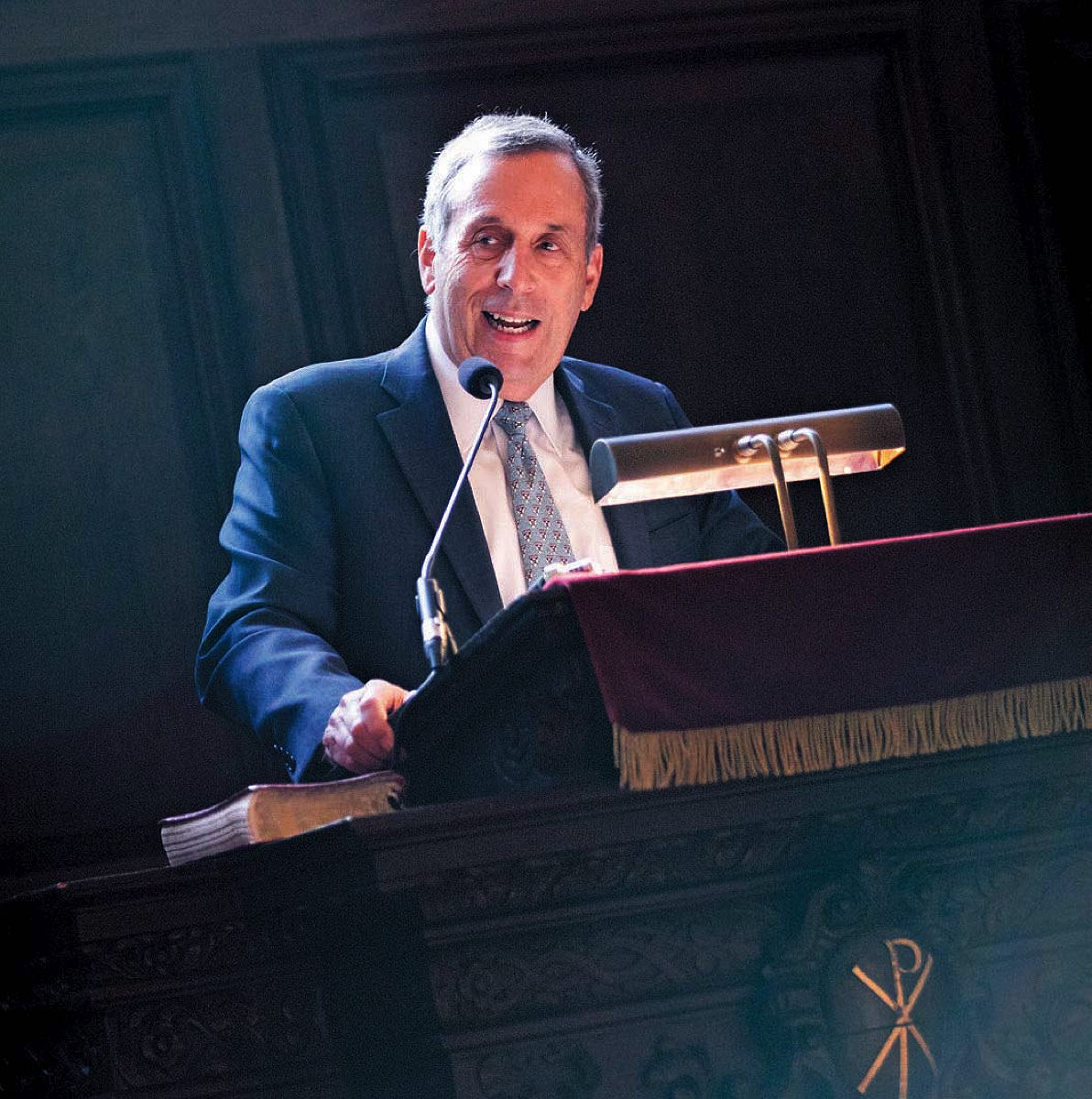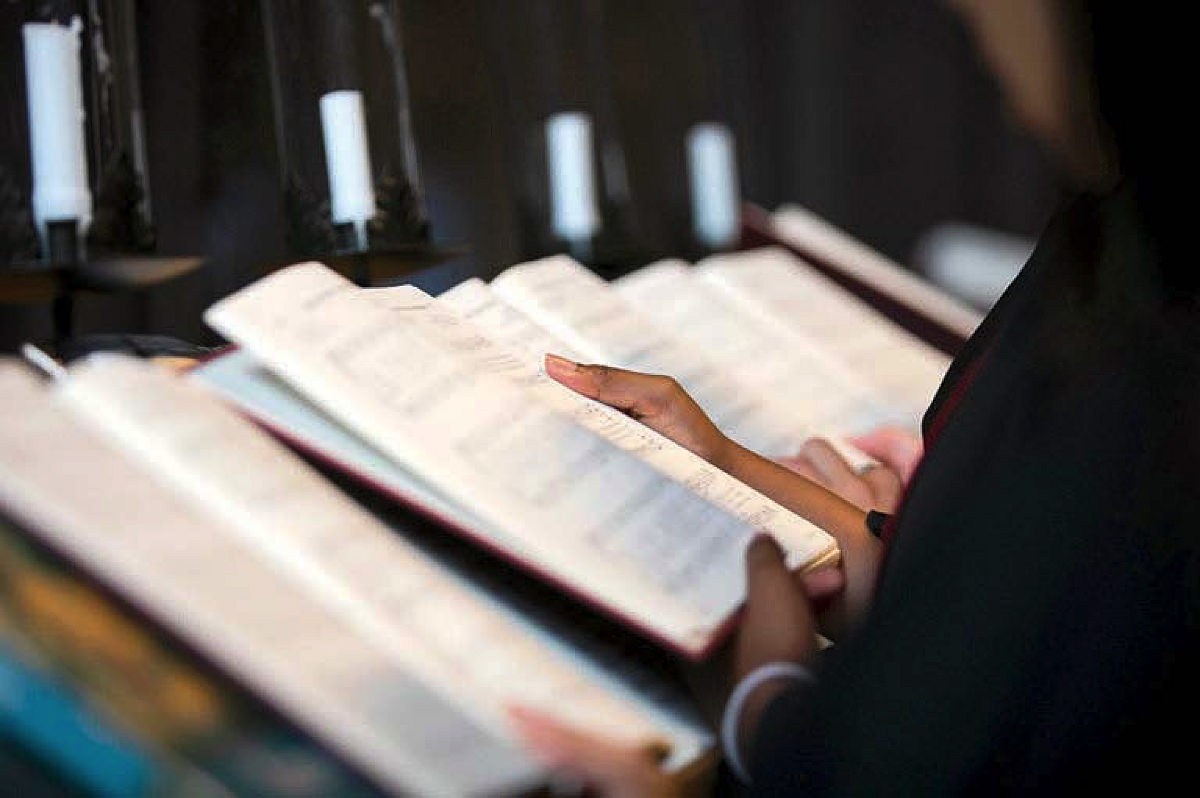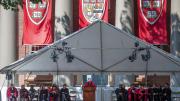During this semester’s opening exercises, University leaders were at great pains to encourage the Harvard community to live up to its ideal of forthright discussion, at a time when the wider society seems to be losing the habit. Appearing at these occasions as president for the last time, Lawrence S. Bacow returned to his first principles—as an educator and a person deeply grounded in his religious faith—to make a vivid case for free speech and sympathetic listening.
Welcoming members of the class of 2026 at their Freshman Convocation in Tercentenary Theatre on August 30, Harvard College dean Rakesh Khurana said he wanted to “urge you to think seriously about why you’re here.” Speaking bluntly, he continued, “You’ve arrived at a difficult moment in…history, with the question of who we are, who we thought we were, and who we’re going to be, all in play.” Underscoring the importance of the search for truth—“Veritas is more than just a slogan”—he condemned conformity and “comfortable lies.” The hard work of growing in wisdom, he said, entails recognizing that “we don’t know everything. We need to appreciate our imperfections, our fallibility, and acknowledge that we are error-prone, and that human beings can hold on to a serious error for a very, very long time. It’s not easy to approach the world with questions rather than answers.” But it is important, Khurana insisted, to do so—beginning that day.

Bacow, in a softer vein, outlined the best way to proceed. “One of the many reasons we admitted students from around the world,” he said, “people with every interest imaginable, is because we learn from our differences. As you get to know your roommates and your classmates, try to be slow to judge and quick to understand. Give everyone the benefit of the doubt, at least initially… and you will be surprised by the number of friends you will acquire, people quite different from you, but people who will enrich your life immensely.”
He acknowledged that doing so is not always easy: “You may meet people at Harvard that you do not like.…[E]verything that you may find objectionable in the larger world is present in some measure here. We are not perfect, but we strive to be better.” Returning to Veritas, he added, “It is the reason we exist, to seek the truth.…If you really seek the truth, you must engage with those who think differently than you. Even more importantly, you must be willing to change your mind—to be persuaded by a better argument or new information. Only when you have this experience will you be well-equipped to make a difference in the world.”

At Morning Prayers, President Lawrence S. Bacow emphasized that “we learn from our differences.”
Photograph by Kris Snibbe/HPAC
At Morning Prayers the next day, in the more intimate setting of Memorial Church, he made the argument about lively, free, and full discourse in a way that is clearly central to his view of the academy: “A lot could go right this semester—or a lot could go wrong. Nothing is certain, I think, except for one thing: If you and I are all doing our jobs—doing what this institution demands and expects from each of us—what this nation needs from us at this moment—what the world needs of us, I guarantee you one thing—we will all be arguing.”
Having set his hook, Bacow deepened his lesson, saying, “Being quick to understand and slow to judge does not mean being unwilling to argue—it means arguing in a way that celebrates and strengthens our mission, that demonstrates the power of knowledge and the forbearance of wisdom.” In Jewish tradition, he explained, “[W]e have no definitive authority for resolving differences of agreement over the interpretation of texts or doctrine.…There’s no bishop, there’s no pope. The way we resolve these differences is through argument. And indeed if you were to go into any yeshiva…and observe students who are studying our sacred texts, they always do it in pairs. In fact, the imperative is to study with someone else. Why? Because more emerges through the dialogue between two students, through the different interpretations, than one can ever hope to achieve on their own.”

Photograph by Kris Snibbe/HPAC
Citing Rabbi Lord Jonathan Sacks’s argument for argument, Bacow said, “We ought to argue, he asserts, ‘out of a desire to discover the truth, not out of cantankerousness or a wish to prevail over [our fellows],’ not ‘out of envy and contentiousness and ambition for victory.’” Argument mistakenly pursued in the latter spirit, the president said, diminishes both parties because, as Rabbi Sacks put it, “If you win, I lose. But if I win, I also lose, because in diminishing you, I diminish myself […] The opposite is the case when the argument is for the sake of truth. If I win, I win. But if I lose, I also win—because being defeated by the truth is the only form of defeat that is also a victory”: what the rabbi called argument for the sake of heaven.
Speaking his own greatest truth, Bacow urged, “As we begin again to imagine the future—as individuals and as a community—may we all find ways to resist the lure of righteousness. To resist the lure of moral certitude. May we embrace the possibility of transcendence through argument. And may we live life again,” as the pandemic loosens its grip, “with greater appreciation of its fragility—and for our dependence also on one another.”
As someone who has devoted his professional life to the academy through his current service, Bacow ended his lesson on the centrality of fruitful argument by urging, “Our beloved Harvard—and all the institutions that preserve and protect truth—must endure. And we, all of us, must do all that we can to see that they do, with gratitude and hope for our time and for times to come.”
Read full reports at harvardmag.com/convoc-22 and harvardmag.com/morning-22, respectively.









